



On October 16, the Communist Party of China (CPC)’s 20th Party Congress begins. This once-in-every-five-year event will witness delegates paraded in Beijing for a week-long political huddle.
As usual, the forthcoming congress has already caught the cynosure of eyes both within China and abroad. However, these regular party congress sessions are a post-Mao Zedong phenomena. Since the 11th party congress in 1977, there has been no disruption of the subsequent party congress sessions, and their central committee plenums.
With reforms and an open door policy under Deng Xiaoping's leadership, the gradual institutionalisation of politics took shape in China. This edition also traces its legacy from that early reform period. The party congress sessions have been regular, with some exceptions, and differences of a few months.
The dress rehearsal for the 20th Party Congress began as the seventh plenary session of the 19th central committee was held from October 9-12. The plenum's agenda was the approval of the draft reports made by the 19th Central Committee to the 20th Central Committee, the 19th Central Commission for Discipline Inspection (CCDI) report, and the amendment to the Party statute. As per the communique, it looks like Xi Jinping has emerged even more powerful. It notes that under Xi’s leadership and guidance as a core, the party has succeeded in addressing ‘challenges such as corruption, domestic political stability and responding to the complex international situation’.
Composition Of DelegatesThe 20th congress session has 2,296 delegates from 38 electoral constituencies representing provinces, the People’s Liberation Army (PLA) and the armed police, and party and state organs. The number of female and ethnic representatives is 619 and 264, respectively. At least 100 are female minorities. This system makes the representation of women and minorities a mere sign of tokenism, as both can lose to the dominant Han group in the ultimate central committee membership selection. With 52.2 as the average age, almost 95 percent are college educated and above.
This shows a continuous thrust of the party on education and age pre-requisite for political mobility. On the other hand, farmers and workers constitute 85 and 192 delegates, respectively. The trend shows that more professionals and technicians are getting chosen as delegates. This also reflects the overall changing composition of the party membership.
Besides, unlike the previous congress, China’s National Taiwan Association is renamed ‘Taiwan Province’ with 10 delegates. This is a marked departure from the existing status quo. In addition, Hong Kong, and Macau congress delegate list is merged, and elected as delegates-at-large. One other category of delegates is the current central committee members. At least 200 representatives are incumbent 19th central committee members. Many of these member delegates have been groomed by Xi since 2012.
Xi’s Opportunity For New AlignmentsIn reality, the 20th congress is a power transition phase. But Xi seeking a third term and no anointed successor makes this session even more pertinent to observe. With cult personality status, and an absence of challengers within his clique or from others, Xi is on a par with Mao, not to mention Deng. Unlike his predecessors — Jiang Zemin, and Hu Jintao, surviving party elders checked the incumbents' power. Xi, on the other hand, defanged them by building a coalition with like-minded factions, and unleashing anti-graft campaigns.
How Xi will employ this ‘empowered’ status to his advantage is to be seen as the congress unfolds. Xi’s existing protégés, like Li Qiang, Chen Miner, and Cai Qi, have no adequate experience compared to Wang Yang, the current Politburo Standing Committee (PBSC) member, and Hu Chunhua, Vice-Premier and politburo member. Xi, therefore, has to tread a cautious path at the same time. Likewise, being a lingxiu-people’s leader and a hexin-core, Xi can promote Shen Yiqin, a woman of Bai ethnic minority and Guizhou party secretary, to the PBSC. A mere promotion to the politburo is just a continuum.
Under Xi’s new era, the party is everything. Since the CPC is the vanguard of the Chinese State, it encapsulates every State institution. From cadre and membership regulations, the Leninist party has become the sole harbinger of the Chinese dream of national rejuvenation. As it celebrated its hundredth founding anniversary, the ‘party’s self-governance’ and ‘vigorous party reform’ have become the cornerstone of the party-building initiatives.
So the congress will witness the presentation of the party general secretary’s political report. It is a crucial task to report an assessment of the previous term and foregrounds the tasks ahead for the future. It would not be surprising if the congress under Xi might elevate the party to a ‘Leviathan-like status’ with a new ideological canon, leadership personnel, and organisational structure.
Nevertheless, transition periods can be unstable too. A week-long political event and manoeuvring can make or break the careers of political leaders worldwide. China is not an exception.
Bhim B Subba teaches Political Science at the University of Hyderabad, and is a visiting researcher at the Institute of Chinese Studies, New Delhi. Views are personal, and do not represent the stand of this publication.Discover the latest Business News, Sensex, and Nifty updates. Obtain Personal Finance insights, tax queries, and expert opinions on Moneycontrol or download the Moneycontrol App to stay updated!
Find the best of Al News in one place, specially curated for you every weekend.
Stay on top of the latest tech trends and biggest startup news.